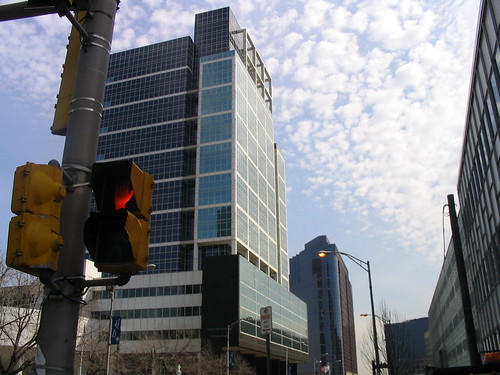You may have heard that Adobe and Macromedia are about to get their merger grove on (actually, it's a
$3.4B buyout of Macromedia by Adobe, but it's the same thing). If you didn't know
Adobe is the software company that brought us such wonders as postscript (pretty printing), PDF and PhotoShop and
Macromedia is the company behind flash and shockwave.
So one
really big company with a ton of important software buys a
big company with a lot of important software... who cares? In answering that, I'll divide "caring" into 3 types... 1) caring 2) not caring and 3) should be caring, but won't.
I fall into the first category. Adobe and Macromedia compete directly in at least two important software markets - vector drawing and web publishing/web graphics. As far as vector drawing goes, Adobe has Illustrator and Macromedia has Freehand. In the web world it's Adobe's GoLive vs. Macromedia Dreamweaver and Fireworks. We all might have our favorites here - I, for instance prefer GoLive to Dreamweaver... but that doesn't matter. What matters is we have choices and that there is competition between the two companies driving the other to innovate - both in features and in price. Generally, removing the competition in the long run will hurt the market, raise prices and slow technological innovation. I hope the merger is either not approved or Adobe is forced to divest itself of the overlapping products (Dreamweaver or GoLive; Freehand or Illustrator).
Most people fall into the second category - not caring. Maybe putting the two companies together will combine the benefits of the two previously separate products and eliminate their respective shortfalls. Maybe some unique synergy of awesomeness will rise up, mixing Macromedia's wildly powerful flash and shockwave with Adobe's 2D print, page layout and photographic goodness. That's certainly what Adobe says they want to have happen. But whither the web design competition?
I have a feeling the Department of Justice Antitrust division and the Federal Trade Commission fall into the last category - should be caring, but won't. These two entities are charged with enforcing the Antitrust laws - especially the Clayton Act and the
Hart Scott Rodino Act (Pete Rodino of Hart Scott Rodino was a long time Newark NJ congressman and remains an icon of
Seton Hall Law School). To that end the two agencies put together some
guidelines for horizontal mergers. They're supposed to analyze each merger according to the guidelines - if it passes the test, the government doesn't sue to stop the merger - if it fails the test, they're supposed to try to stop the merger. A lot of time and effort went into the guidelines and they're pretty good...
when they're actually followed. The trend lately has been for a review of a merger... and then nothing. No objections.
The guidelines are long and complicated and frankly, most of you will find this post way to long and boring already... but suffice it to say, I think this merger will fail the test. If you're interested in the basics of why, read on... otherwise... check back in a few months to see if this gets approved.
The (very very simplified) gist of the objection has to do with the market already being highly concentrated and the post merger market being even higher. The merger guidelines describe 3 types of markets: unconcentrated, moderately concentrated and highly concentrated, calculated using HHI concentration index (HHI uses the sum of the squares of the marketshares of the participants). While I don't have marketshare numbers for Adobe and Macromedia in the web design or vector drawing markets - we can assume they are high. If they both have 30% of each market - the HHI pre-merger index would be 1800 and post merger would be a whopping 3600 - putting the merger in the "highly concentrated" range. Any change in the HHI of more than 50 points (here we have an 1800 point move) is to be presumed anticompeditive under the merger guidelines. The presumption can be rebutted by a couple of factors... such as ease of entry into the market... or if one of the firms was about to exit the market because of failure... or extreme efficiencies (the efficiencies needed to overcome the presumption rise in proportion to the increase in competition - so we'd need a LOT of efficiencies here). Long story short, the market just becomes too concentrated and too much market power is consolidated in Adobe.











